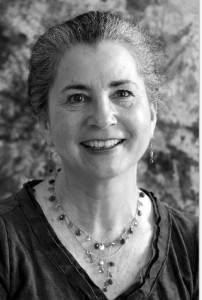 When Patti turned 50, she challenged herself to write a novel. Six years later, she has five novels in publication—including some “steamy” romances—and has three more on the way.
When Patti turned 50, she challenged herself to write a novel. Six years later, she has five novels in publication—including some “steamy” romances—and has three more on the way.
Tell us a little about your background…
I live in Evanston, Illinois, where I also was raised. I went to Grinnell College where I earned a BA in anthropology, which is a good major for someone like me who has a lot of interests but little focus. I also did my junior year abroad at the University of North Wales, where I studied archaeology.
When I was 24, I opened an Irish and British Import store. I had that shop for 15 years until the birth of my second child. I miss the travel but not the shop.
Since I was a teen, I have caned and rushed chair seats, which was a family business. I still do that as my day job. I was able to work at home while raising my kids, but it is in no way my calling. I worked part-time at the Wilmette Public Library for a time as well, which was heaven.
I’m married with two children of my own—Healy, 19 and Joe, 16—and a stepson, David, 33.
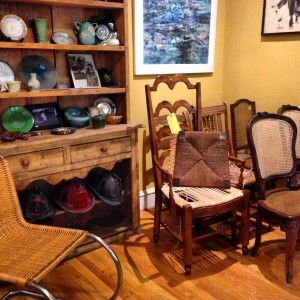
Work in progress – my day job.
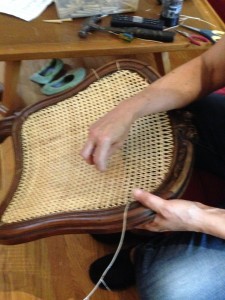
When did you start thinking about making a change?
I’ve always struggled with trying to find a fit in the job market. I readily admit I opened a shop so I didn’t have to look for a job.
When our children started to grow up, many of my stay-at-home mom friends and I started to ask, “What next?” We were a group of talented, smart women who had been funneling our energy for years at our respective grade schools into things like Fall Fest, silent auctions, and the world of the PTA. Now it was our turn. I’m happy to see all my friends successfully entering this new phase.
I was feeling adrift. I even took a Myers-Briggs personality test, which only seemed to confirm my suspicion that I’m unemployable! I forget which personality type I am, but it’s the one for people who should never work in groups, need constant change, and should never do the same thing for prolonged periods of time—especially with other people.
My “aha” moment came in 2009 when I turned 50. Every year on my birthday, I like to spend time alone, trying something new like Japanese ink and brush painting. For my 50th I decided to try and write a novel. I sat down and it poured out of me. I had finally found my fit, without a doubt.
Had you always wanted to write a novel?
I have tried at various times to write a novel but everything clicked when I turned 50. I had found my bliss. I felt I had to keep my novel a secret—even from my family and friends. I think I believed I didn’t deserve to take that time for myself after years of doing for others.
I was almost finished with my secret opus when my finger strayed on the keyboard, and I deleted the whole thing! I had to say to my husband, Bob, “That novel I’ve been writing in secret? Well, I just deleted it.”
Thankfully, Bob helped me recover my novel. I hired an editor, Garnett Cohen, to help me with my completed manuscript. I learned a lot from her and she validated me as a writer.
I titled my first book Smoke Damage and self-published it in 2012.
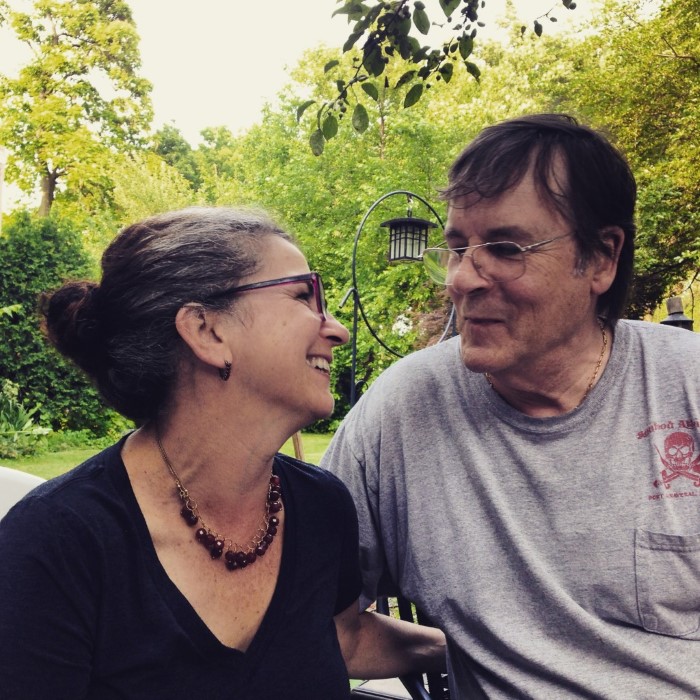
With Bob
Tell us more about Smoke Damage…
It’s a piece of narrative nonfiction, meaning it’s an embellished memoir. I published it and then let it sit there unnoticed for years, because at the time I knew nothing about marketing, and also because it’s a very personal work, which includes family secrets.
I intersperse chapters from my experience growing up in Evanston with chapters about living and raising my own children in the same town (though literally on the other side of the tracks). It deals with fear and how we learn to cope with it. There is such a different culture around raising children now than in my parents’ generation and that interested me, so I juxtaposed those different attitudes.
I was raised in a family with multiple generations of firefighters; knowing what my father and grandfather experienced as part of their job left me feeling anxious and fearful even within our stable family situation. During my teens, my neighborhood changed and became a dangerous place, with gun violence and drug dealing steps from my house, so any imagined fears I had as a child became more concrete.
Still later, my father suffered from chronic health problems and alcoholism. My family, although still intact, entered a new, dysfunctional phase. My father died at 50. My mother lived for years after him before dying of pancreatic cancer but, before she died, she picked up the pieces and we had a short golden time. After her death, my sister and I found letters from someone my mother had a 10-year affair with, a woman who was a key fixture in our house during the dark days. They considered themselves married.
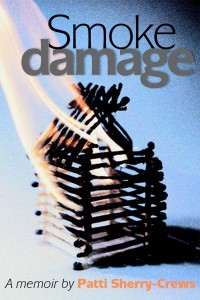 Smoke Damage partly is about me looking back at my parents’ marriage with that new knowledge and learning to forgive them as people who were not only parents but human beings with a limited toolbox, trying to cope. I lived for years seeing my father as a flawed parent, but I had to reevaluate my view of him.
Smoke Damage partly is about me looking back at my parents’ marriage with that new knowledge and learning to forgive them as people who were not only parents but human beings with a limited toolbox, trying to cope. I lived for years seeing my father as a flawed parent, but I had to reevaluate my view of him.
No judgment about my mother: I’m very sympathetic to her situation. The time we spent with her “friend” and her kids are precious memories. I actually think that relationship saved my mother, and may have saved my sister and me too.
It always interested me that my mother, who was the most open person in other respects, would keep this from me. She lived for two years with cancer, knew the end was coming, yet left those letters for us to find. I’ll never know what she was thinking by leaving rather than destroying them, which is another sub-topic in Smoke Damage: the frustration of having to live with unsolvable mysteries in your own life.
I’m not actively promoting it at this time, but not because of family secrets (and there are others in the book), but because I don’t know how interesting it is to other people.
How did your second book come about?
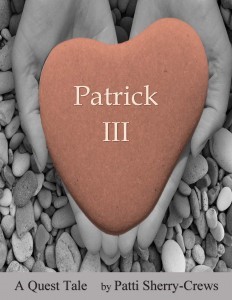 I started my second book, which I call my quest novel, in 2010. It’s based on a trip I took to Newfoundland with two generations of women in my family, with the goal to trace our roots. We found out that our family landed in Newfoundland when our ancestor escaped a prison ship bound from Ireland, but there was no detail other than the date, 1800. That entry haunted me for years. So I started a novel inspired by that trip, although it is completely fictional.
I started my second book, which I call my quest novel, in 2010. It’s based on a trip I took to Newfoundland with two generations of women in my family, with the goal to trace our roots. We found out that our family landed in Newfoundland when our ancestor escaped a prison ship bound from Ireland, but there was no detail other than the date, 1800. That entry haunted me for years. So I started a novel inspired by that trip, although it is completely fictional.
I was stuck so I picked it up and put it down at regular intervals until I was finally able to complete it. It’s called Patrick III: A Quest Tale and it’s available on pre-order now.
How did you get unstuck and keep writing?
One year, I decided to enter NaNoWriMo (National Novel Writing Month), a self-challenge that takes place every year in November. The goal is to write a novel of 50,000 words in one month. I sat down on November 1 without a clue what I was going to write, other than starting with an encounter I had with a stunned neighbor on his way to work. He pointed to a deer standing across the street, staring at us. Then he told me just before he saw the deer, a raven dive-bombed him and hit his car window. I said, “That’s a lot of stuff to happen to a person before 7 am. Maybe you should go back to bed.”
So I started out with the premise of what would have happened if my neighbor didn’t go to work that day. Soon my neighbor became a female, and the book went wildly off-course from where I thought it would go. My characters completely took over and wrote their own story.
I finished the first draft of this novel, Nest, on November 22. I showed it to a few friends and they enjoyed reading it; but one friend looked at me suspiciously and asked, “Is this a romance?” I was stunned but then realized it is a romance! I’m doing some rewriting now and hope to be ready to publish this fall/winter.
What did you learn from writing a novel in three weeks?
I discovered that I really can take hours a day, guilt-free, to write. Nobody in my family starved or had to leave the house in dirty clothes. I still was able to organize my day to take care of business AND write a novel, and it made me so happy. I did it! I also learned I like to write romances. That might not sound so earth shattering but defining a genre and focus for myself opened it all up to me.
You’ve also written a series of romances. Can you tell us more about those?
Yes, I’ve written and self-published four “steamy” literary romances—romances with a real story behind them. They aren’t exactly representative of my work, but I stand by them, and people enjoy them. I used them to test the waters and to earn some money to apply toward the two novels I’d spent years on. I had so much fun writing them.
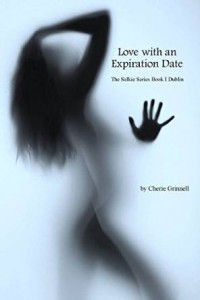 I call these books (tongue in cheek) American Chicks hooking up with Brits and Micks. Three of the books are part of the Selkie Series, set in Dublin. A selkie is a seal that sheds its skin and lives on land long enough to have a passionate encounter before finding his or her skin and returning to the sea. I wrote the first one in 2014, at the age of 54, as part of a Camp NaNoWriMo challenge (which takes place in April every year) and considered it a stand-alone, but people who read it asked for more.
I call these books (tongue in cheek) American Chicks hooking up with Brits and Micks. Three of the books are part of the Selkie Series, set in Dublin. A selkie is a seal that sheds its skin and lives on land long enough to have a passionate encounter before finding his or her skin and returning to the sea. I wrote the first one in 2014, at the age of 54, as part of a Camp NaNoWriMo challenge (which takes place in April every year) and considered it a stand-alone, but people who read it asked for more.
I loved writing the Selkie Series and it got some excellent reviews. One reviewer said, “A rousing novel—or arousing: it is a turn-on, intellectual as well as sexual. This is erotica with witty dialogue and a sense of humor” which made me proud though I don’t think it quite qualifies as erotica, and I don’t know how intellectual it is either, but the characters are smart. I think the reader definitely gets why they’re attracted to each other.
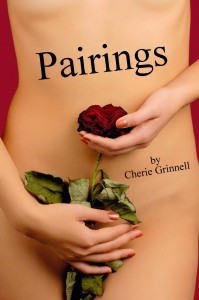
Woman holding a withered red rose in her hands
The fourth book, Pairings, is set in Wales. There isn’t nearly as much sex in Pairings
as in the Selkie Series; it’s heavier on the romance and the developing relationship between the two main characters. Some people have told me they like Pairings
better because of the banter between the hero and heroine. I did have to make their interactions scintillating because I make the reader wait so long for them to get together!
Was it a challenge to write the sex scenes?
I don’t especially enjoy writing sex scenes, but I did want to try. I prepared by reading what was out there. I wasn’t sure what the boundaries were, how often to stick in sex scenes, or what language to use. I also read books about writing love scenes like How to Write Sexy Descriptions and Sex Scenes by Val Kovalin. Indie Author Group on Facebook has files accessible to members on a variety of topics and one of them is Erotic Synonyms, which was helpful because let’s face it, there are only so many ways to describe things.
The rule I stuck to was that if there was a sex scene, it had to tell the reader something about the characters, something about their relationship at that point in the book; or the sex scenes had to propel the action in some way.
At first, I was shy about asking people to read these books because of the sex scenes: I wanted to be sensitive to people’s reading choices. But, to show their support, friends and family bought them and I was surprised at how positive the response was. When those people told me they bought my book I’d always say, “Sorry about the sex. You can skip over those parts.” But they didn’t.
What is your thinking behind using a pen name, Cherie Grinnell, for some of your books?
I write my literary romances under my pen name, Cherie Grinnell. Others will be under Patti Sherry-Crews. I’m using the pen name not to keep my identity a secret (because I’m actually quite proud of my work), but as a branding tool. I don’t want to disappoint or shock people looking for one thing and finding another. People reading a Cherie Grinnell book, as opposed to a Patti Sherry-Crews one, will know Cherie left the bedroom door open.
My friend Colleen Chappelle came up with my pen name. Cherie is a corruption of my last name, Sherry, and Grinnell is a nod to my college alma mater.
What is your take on Fifty Shades of Grey?
I had no interest in reading Fifty Shades of Grey and didn’t understand what the fuss was about. Then one day, while visiting a friend who works at a library, she handed me the book. I was soon back for the second, then the third in the series. I devoured those books! I did think they got more preposterous as they went along.
Most of my friends weren’t able to get through the first book, and a couple thought Christian was a complete jerk (nice word inserted). I read all three—I don’t know what that says about me.
Recently, I have been interacting via Twitter with an author who writes historical romance and she and I are completely on the same page about Fifty Shades. She says someone who’s sold as many books as E.L. James has done something right.
Yes, the dialogue is often silly, and yes, the prose is clumsy, but I’d rather talk about what James did right than what she did wrong. In preparing to write my own romances, I read a number of books on how to write them, and James hit on all the points to write a successful romance.
Fifty Shades of Grey started out as fan fiction for Twilight
. When I read Twilight years ago along with my daughter, I thought Pride and Prejudice
. What I mean by that is you have this powerful, rich, handsome, aloof, mysterious alpha male, who is wounded in some way; you can tell he is and you want to find out what’s going on with him. Then you combine him with a heroine who doesn’t care about his power because she’s smart, independent, and gutsy. There is drawn to/resist action, which is killing you! Add all that and you have an irresistible book—at least to me.
So I say to James detractors, you write a book as an Indie author, it’s so successful you get picked up by a big house publisher, then go on to sell as many books as James did—so many they make movies of your books—then let’s talk.
Why do you think the timing was right for you to find your passion at 50?
I loved turning 50. I think I experienced many of the things women who reinvent themselves in middle age experience. I felt better physically than ever. I had new energy and, more time, and more self-confidence. I’ve learned to push the mute button on my old self-doubt. Now I’m not afraid of making mistakes or looking foolish.
I also feel lucky to live in this day and age; it’s a great time to reinvent yourself. There is so much information available through the Internet. Whether you’re researching a topic for your book, looking into new careers, or joining an online community, all you have to do is search and click.
The other amazing thing about the Internet is that in many professions you can cut out the middleman if you want. If you simply want to get on with your thing, and you’re willing to do your own marketing, you have so many tools available. You can chart your own course if you’re willing to put in the time and believe in yourself. This is true of many professions, not only writing.
What advice do you have for other would-be novelists?
If you’re setting yourself up as an independent, you have to be willing to play the social media game. Being on Pinterest, Twitter, Facebook, and all the other options can get overwhelming, so my advice is to stay in your comfort zone. Unless you’re someone with boundless energy, I’d say build your platform at your own pace but do build your platform. Start that even before you embark on your new phase. There are a lot of people out there willing to engage and help you.
Building a supportive community is very important. I wouldn’t be writing today without encouragement. Ultimately, you have to believe in yourself but getting outside validation can get you through the “wobbly” times.

Our kids: David, Joe, and Healy
Do you recommend self-publishing vs. traditional publishing channels?
When I put out Smoke Damage six years ago, I did try very briefly to send it out to agents but felt I was wasting time I’d rather be using to write more books. It’s so hard to get published, especially in fiction, and especially nowadays. I’ve done a lot of research on the pros and cons of self-publishing.
I wouldn’t encourage writers one way or another, but I feel self-publishing is a better fit for me, and it certainly is becoming more legitimate all the time. Plus, even if you do get picked up, there is the chance you won’t see your book for ages given the publisher’s lead times. Then they may want you to change your book based on what is selling well at the moment—that’s one reason you see so many vampire books in the young adult section of the bookstore.
I’ve also heard from published authors I know that even if you get published you have to do your own marketing anyway unless you want to see your book die on the shelves, and the author’s cut of book sales isn’t great, so for me, self-publishing was a “why not” situation. I chose Smashwords to self-publish Smoke Damage because that’s the only route I knew at the time. I subsequently self-published my four romances via Amazon.
I am considering going through traditional publishing channels for my newest novel, a historical western called Margarita and the Hired Gun. Writing this novel took a lot of research for historical detail, and I read books in that genre before I wrote it. So it ate up a good chunk of time. I was surprised at how quickly I wrote it, but I think it’s really good. I wrote a query letter and synopsis for Margarita and the Hired Gun and it took weeks to get it right—it was such a shot in the dark. I was thrilled to get a positive response from a publisher; they want to see the full manuscript!
I should add that choosing to go Indie (self-publishing or going with a small press) or a more traditional route does not commit you to one or the other. If you’re a new author with a following for the book you self-published, you can approach an agent with some credentials, which might help your chances of getting picked up. Then again, some published authors choose to go Indie if they feel they can make more money and have more freedom. I’m just happy we live in a time where there are options.
You’ve written 8 books in 6 years. What’s your secret?
I write very fast! I’m writing even when I’m not writing, so when I do sit down to write I already have the prose in my head. I rarely have to sit at the keyboard and scratch my head.
I also cycle through my manuscripts, putting a finished draft aside to go back to another one, which helps give me fresh eyes. I actually get excited the night before I go back to an earlier book; it’s like revisiting an old friend. I enjoy editing my work maybe more than writing the first draft. I’m often surprised by things I’ve written. Like when I went back to Patrick III—I forgot how funny it is!
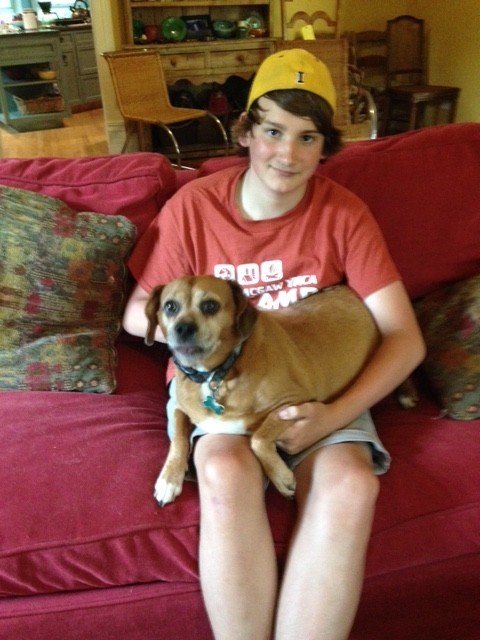
Joe with our dog, Gracie May
Do you have a writing schedule?
Finding my own routine has been critical to reinventing myself. I saw something the other day listing famous authors and their daily word count. Their word counts were all over the map, but they all had a set time of day when they did their writing.
I’ve always worked from home. Before having kids, I was able to set my own schedule. When we had young children, their schedules and routines dictated mine. It wasn’t until around 10 pm, for years, that there was a time of day I called my own.
When I turned fifty, I suddenly had days free to do my own thing, untethered from my children’s lives. It was a life-altering move. I would advise anyone who is considering a change to carve out a set time every day when they start to work on their metamorphosis. Make a commitment to yourself. This is especially important for women because it is too easy for us to put our lives on the back burner.
I also work with my body and brain when forming my routine. First thing in the morning, my mind is in a better space to do the things I abhor like writing query letters or book blurbs. Then, I go for a 5-mile+ walk, which is when I do the most important part of my thinking for that day’s writing. Mid-morning, I do my day job and run errands.
All the time, no matter what I’m doing, I’m writing in my head, so when I sit down at the computer in the early afternoon with a softer brain, all the thoughts and pieces of dialogue that have been percolating in my head pour out onto my keyboard.
Had I not established a routine, I doubt I would be doing what I’m doing now.
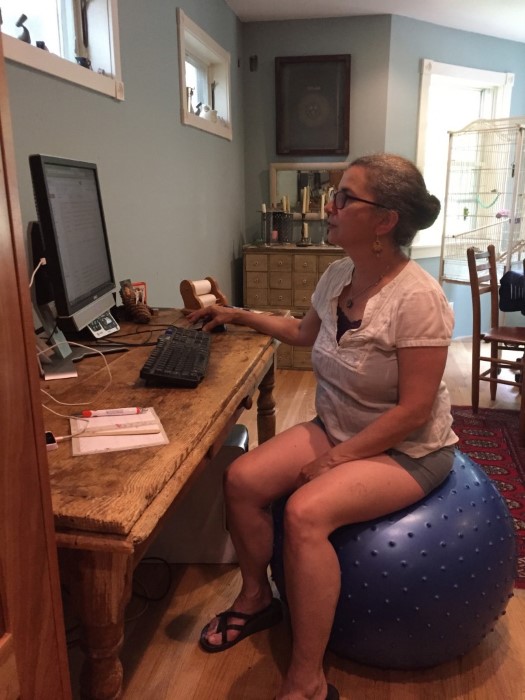
I sit on an exercise ball, which I recommend for anyone who has to sit at a desk for hours.
Have your family and friends been supportive?
Yes, that’s never been an issue. I was a little hesitant to tell more than a limited group of friends and family about the novels I published under my pen name. My daughter-in-law, Cara, and her mother are two of my biggest fans. My mother-in-law is 92 and has read all of Cherie’s novels on her phone!
My husband, Bob, who is semi-retired, is the first person to read any of my work once I’m done with my final edit. He’s a detail guy, whereas I’m a big-picture person who is going to miss typos. Bob is a pretty good line editor; he works in the next room at his desk while I work yards away at my desk in the kitchen. My daughter says it’s actually “painful” to watch us work together. We have this routine where he mumbles something I’m supposed to hear and I make a big point of standing up, walking to the door, and shouting “What? Were you talking to me, or are you mumbling to yourself?” This goes on all day.
Bob also helps me with any formatting or technical stuff. I don’t know what I’d do without him.
My kids are very supportive, each in their own way. Because I work in the kitchen, it’s like working in a busy intersection. I think Joe especially respects my space, but he only reads when necessary for school, so he’s never read anything I’ve written.
Healy, on the other hand, loves literature and reading, so she’s read sections of almost everything I’ve written. She’s very helpful for instant feedback; I can bounce ideas off of her, and she has a knack for giving me encouragement when I most need it—without being told.
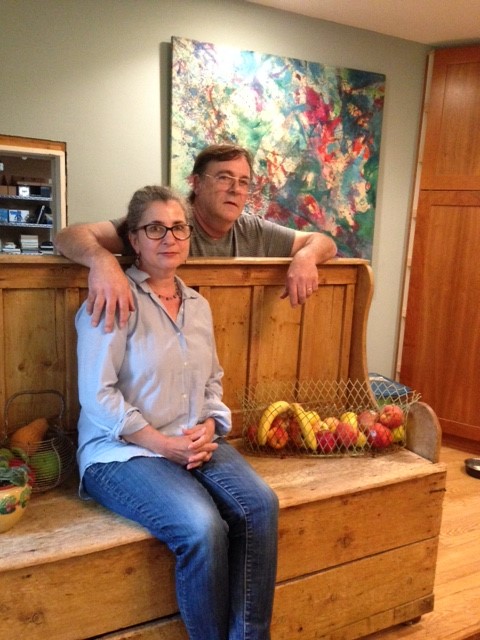
This “barrier” separates Bob and my work spaces.
What resources do you recommend?
National Novel Writing Month: Nobody but you is going to read your Nano book, but you can work with writing buddies to encourage each other, keep track of your word count, and find online tools. They are also good at sending out emails with inspiration just when you seem to need it.
The Indie Author Group: This Facebook group was maybe the single most important thing I did. It’s a wealth of information on self-publishing.
APE: Author, Publisher, Entrepreneur-How to Publish a Book: This whole publishing scene is changing so rapidly, but this was the first book I read on the subject. Not only is it entertaining, it also makes self-publishing easy to understand for the newbie.
This is the writing nitty-gritty stuff but I love sites like Grammar Girl for help with grammar and punctuation.
Fiverr is a good website to find cover artists at a low cost. I’ve also used Deposit Photos to buy images to make into book covers. Ideally, if you have resources to hire a good book cover designer, you can find a list of artists in the file of Indie Authors on facebook.
I read a lot of books on writing but my favorite is On Writing: A Memoir of the Craft by Stephen King—even though I patently disagree with his stance against adverbs. People use adverbs in speech, so I say, use a few in your writing. However, know the rules before you break them.
The path to calling yourself a writer or an artist can be full of stumbling blocks you’ve put up yourself. Here is a book many of my friends used to help them. I admit I didn’t finish it, but what I did read was helpful. It contains exercises as well. The Artist’s Way by Julia Cameron.
There are a lot of other helpful books out there:
Writing a Romance Novel For Dummies by Leslie Wainger
Dialogue and Showing and Telling in Fiction
by Marcy Kennedy
Wired for Story: The Writer’s Guide to Using Brain Science to Hook Readers from the Very First Sentence by Lisa Cron
How to Make an Ebook Cover: For Non-Designers by Kate Harper
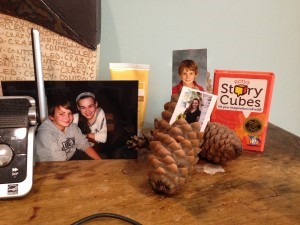
On my desk, I keep family photos and…
![2015-07-05 11.20.36[1]](https://helenetstelian.com/wp-content/uploads/2015/07/2015-07-05-11.20.361-300x225.jpg)
…my favorite cookbooks
Who are some of your favorite authors?
I am in awe of Colm Toibin and William Boyd—they are both prolific writers and each book is unique. Both men are very good at creating believable women characters.
The Blackwater Lightship by Colm Toibin
The Blue Afternoon by William Boyd
I also jump right to the library whenever Kate Atkinson or Tana French has a new book out. French writes mysteries set in Ireland.
Case Histories by Kate Atkinson
In the Woods by Tana French
Speaking of mysteries, I was onto the Scandinavians long before The Girl with the Dragon Tattoo became such a hit. Mankell’s ten-book series featuring Detective Kurt Wallander was made into a BBC series. I found The Indian Bride
, by Karin Fossum, moving, because you have more empathy for the victim and her husband than you normally do in a mystery. It also hits on the theme you’re seeing more of in Scandinavian mysteries: immigrants. Waves of immigrants from Africa and elsewhere are changing society in northern Europe and causing new challenges.
Faceless Killers: The First Kurt Wallander Mystery by Henning Mankell
The Indian Bride by Karin Fossum
Jar City: A Reykjavik Thriller by Arnaldur Indridason
For nonfiction, I always recommend Tony Horowitz and Bill Bryson—both hilarious as well as informative. Confederates in the Attic delves into present day southerners’ feelings about the Civil War and is relevant to events we’re currently watching. In A Voyage Long and Strange, Horowitz crafts an eye-opening book and entertaining read. He goes into American history beyond what we learn in school. My whole family read Bill Bryson’s A Walk in the Woods years ago; it is the hilarious and informative account of Bryson’s attempt to hike the Appalachian Trail from beginning to end.
Confederates in the Attic: Dispatches from the Unfinished Civil War by Tony Horowitz
A Voyage Long and Strange: On the Trail of Vikings, Conquistadors, Lost Colonists, and Other Adventurers in Early America by Tony Horowitz
A Walk in the Woods: Rediscovering America on the Appalachian Trail by Bill Bryson
Currently, I’m on a Jojo Moyes kick. One of my beta readers told me my books are like hers, so I started reading them. I don’t want to compare myself to a published, well-known author, but yes, my books have a similar tone: fiction with romantic elements, witty dialogue, interesting characters, and plenty of tension—but they leave you smiling.
The Last Letter from Your Lover by Jojo Moyes
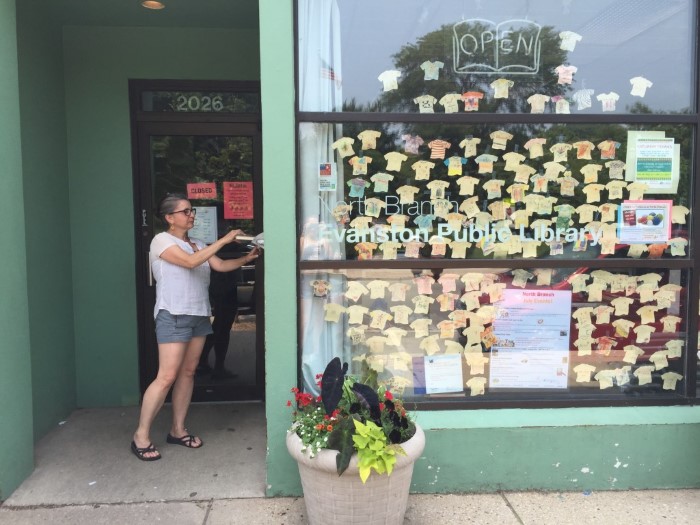
I’m a big library supporter. Here I am at our local branch, just a few blocks from my house!
What’s next for you? Any thoughts on your next book?
This is it. The great thing about writing is that nobody can stop me. I’ve always had so many stories running through my head; it’s great to have an excuse to sit down every day and indulge my fantasy life. And, with a few clicks on the keyboard, I can share them with others.
What book do I want to write next? Good question. Another good question is whether Cherie or Patti will write it! I hope Patti does, but I am waiting for the spark of inspiration.
Cherie’s books are easier to write and finish. They are shorter and the format of romance novels is pretty much laid out, which makes plotting easier. Patti’s books are about twice as long and involve many more plot intricacies. I also need a prompt—some incident, which captures my imagination—I can’t just make that happens. Fingers crossed.
Contact Patti Sherry-Crews at pattisherrycrews16@gmail.com
Website: http://cheriegrinnellauthor.com/
Facebook: https://www.facebook.com/pages/Cherie-Grinnell-Author/1560094420912035
Twitter: https://twitter.com/CherieGrinnell
Pinterest: https://www.pinterest.com/cheriegrinnell/
Books:
Love with an Expiration Date: The Selkie Series Book I Dublin
Love Across the Pond: The Selkie Series Book II Dublin
Love and the Happily Ever After: The Selkie Series Book III Dublin
Pairings
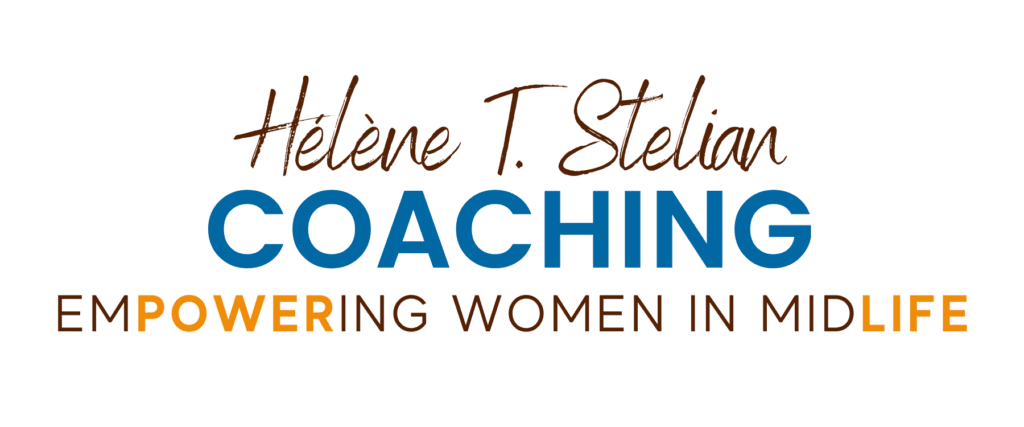
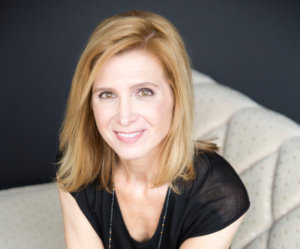
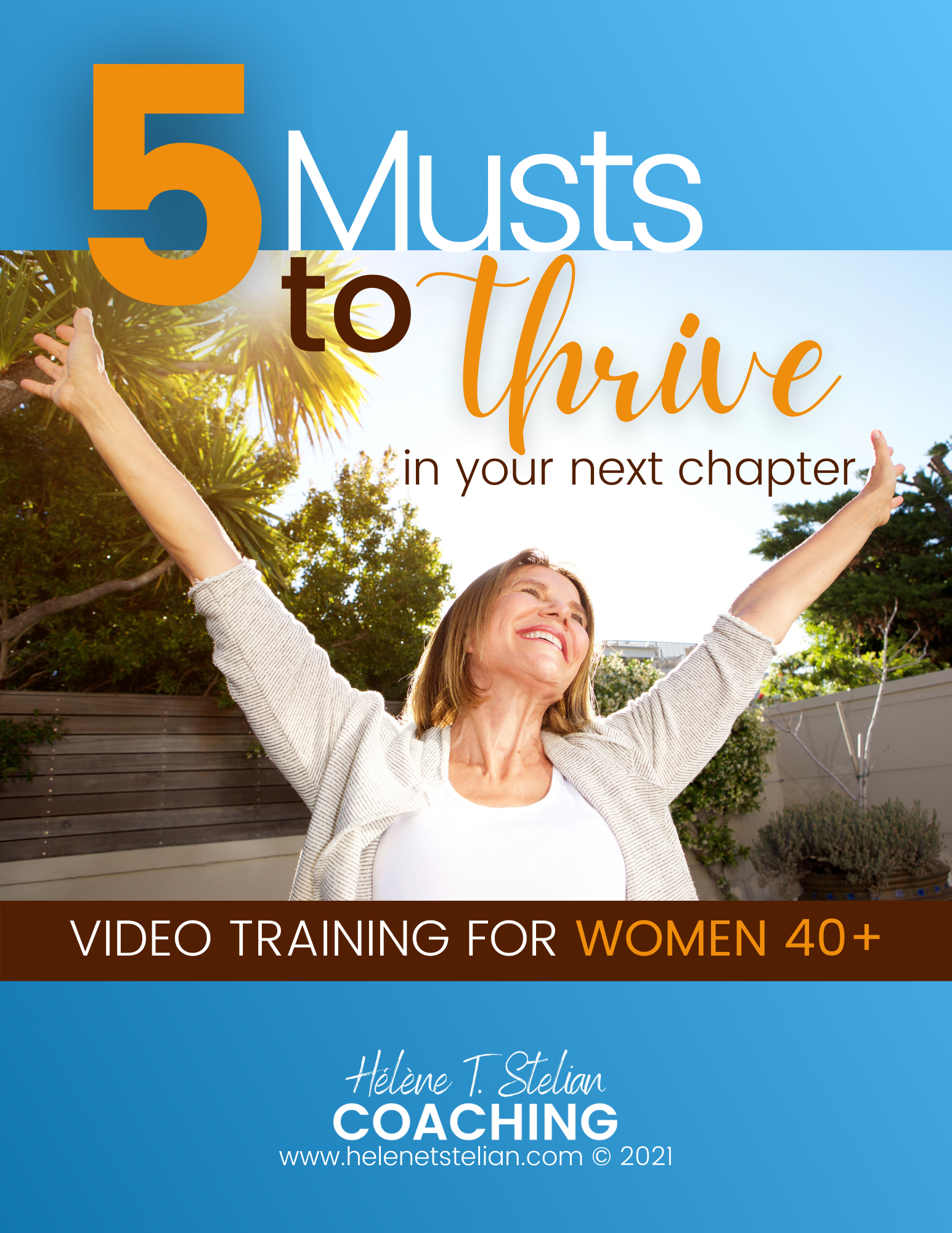



I loved this post!. It was like having a pot of tea with a good friend. Looking forward to reading your books and sampling some of your favorite authors. Wishing you a peace filled day, Terri
Thank you, Terri! I believe that is the nicest compliment I’ve ever received. Do enjoy the books I’ve read–and written. I’d be interested to hear what you think of any of the books I recommended. Talking books is one of my favorite things.
Great interview and I appreciate the advice! Writing fast is something I definitely can’t do. I am in awe of that.
Cathy, I recently saw a chart of famous authors comparing their word count. The range was broad with some writing hundreds of words a day to others writing thousands a day. The key thing for all of them was establishing a daily routine. When I sit down to write at my designated time of day, writing is like a conditioned response. Happy writing to you!
This post was so inspiring. I’d always thought about publishing a book but haven’t gotten around to it yet. I’m going to save this post as a resource. Thanks so much!
Thank you, Rebecca! This is a good time to be a writer, because there are so many options available. Self-publishing is a legit way to go. It is a lot of work. I find writing a novel is the easy part! It’s very easy to put your book out there yourself, but you then have to keep it visible, which is the hard part–unless you have a knack for marketing. Good luck! Writing is fun.
I just followed “Sherry” on Twitter. What a great interview.
Thanks Corie! The two of you are so inspirational!!
Corie, thank you, first of all. I just read the piece Helene did on you. I can’t tell you how much of your experience resonated with me. Congratulations on getting your story out there! I was having a wobbly day here, and in some case of divine timing, I read what you had to say, and without going into details, YOU inspired me today! I love the story behind Mannequin and love to hear young people are feeling strong and optimistic about the arts scene today. I’m happy to say that since my blog post I signed a contract for my western. If anybody had told me 6 years ago I’d be a published author, I wouldn’t have believed it. Your story reaffirms that it is never too late to change course, and how perseverance and self-belief win out. (congrats to your daughter too! I also wrote four erotic novels just for fun…I’m not laughing to the bank, but I’ve made a few people smile).